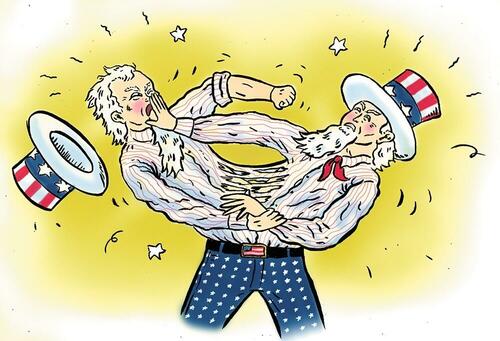
Authored by Matt Taibbi via Racket News,
Voting says very little about who we are, but propaganda telling us otherwise reveals a lot about America's political leaders...
The cycle was the usual nonsense. At a Donald Trump rally in Manhattan a comic called Puerto Rico a “floating island of garbage.” Joe Biden emerged from his crypt to croak, “The only garbage I see floating out there is his supporters.” The Internet exploded. Reporters were dispatched around the country to gauge how much more pissed off everyone was now.
ABC’s take interviewing Harris supporters in Pennsylvania was, “Voters view one another across partisan divide with increasing animosity.” They quoted humans-in-the-street, who all felt strongly. “I would say that some of them are garbage,” said Samantha Leister, 32, while Shawn Vanderheyden, 44, opined, “I just think they are uneducated, and they believe all the lies.” ABC summed up the cultural divide: “Interviews with voters in battleground states reveal that it’s only growing deeper and more insurmountable.”
Surely people know it, but this is all a trick. First, campaign writers only talk to people at campaign events, so the pool of quotes is automatically pared to holders of Very Strong Political Opinions. Second, the odd “Who cares?” answer is instinctively culled by campaign writers as commercially/politically unhelpful. Non-voters or even just people who care more about other things than Harris/Trump — UFOs, knitting, the girl in biology class — ruin the suspension of disbelief. You end up reading copy that hugely over-represents that strange subset of people who define themselves by their votes.
When I was first sent to cover campaigns in 2004, a year in which 40% of eligible voters didn’t bother, I was troubled by the absence of non-voters in coverage. A Rolling Stone editor with whom I rarely worked rolled eyes and said, “We don’t cover them because they’re not part of the fucking story,” which I instantly knew wasn’t true, but I was new and to my shame I didn’t say anything. The numbers of non-voters exposed how inconsequential presidential politics was for most people. It measured the number of people left behind or out, and leaving the non-enthused out of the shot was journalism’s way of covering the holes in the charade.
Two years later I was embedded with a group of Oklahoma reservists sent to work as MPs in Iraq. Sgt. Stephen Wilkerson was the team commander. He wore a tattoo on his foot with an arrow pointing to his big toe that read, TAG GOES HERE. His nickname was “Stretch-Nuts” because it was said he could balance a Heineken bottle on his ball-skin. On my first day he asked what I do. I cover presidential elections, I said. He made a jerk-off gesture. That was the last mention of politics on the trip.
In the roughly twenty years since the act of not voting, or even just not really really caring about presidential politics, has been villainized. Now the emotionally healthy person, the one who has a life and isn’t consumed with fears about the Next Hitler, is assumed to harbor secret sympathies, as bad as the worst MAGAT.
This is different from the old scam.
Now the person who shrugs and says “Who cares?” is called a liar. Everyone must care the way they do, and if you don’t care in that right way — every waking minute, with chewed nails and a carefully weeded social circle to match the correct vote and attitude set — you’re garbage.
Many of us have seen in recent years what this hounding has done even to friends or relatives, turning them to Flatland characters, two-dimensional nerve cases scanning everyone for signs of unsuitability.
Whatever happens next week, I don’t ever want to be that. It’s the people who define us by votes who are garbage, not the other way around.
Authored by Matt Taibbi via Racket News,
Voting says very little about who we are, but propaganda telling us otherwise reveals a lot about America’s political leaders…
The cycle was the usual nonsense. At a Donald Trump rally in Manhattan a comic called Puerto Rico a “floating island of garbage.” Joe Biden emerged from his crypt to croak, “The only garbage I see floating out there is his supporters.” The Internet exploded. Reporters were dispatched around the country to gauge how much more pissed off everyone was now.
ABC’s take interviewing Harris supporters in Pennsylvania was, “Voters view one another across partisan divide with increasing animosity.” They quoted humans-in-the-street, who all felt strongly. “I would say that some of them are garbage,” said Samantha Leister, 32, while Shawn Vanderheyden, 44, opined, “I just think they are uneducated, and they believe all the lies.” ABC summed up the cultural divide: “Interviews with voters in battleground states reveal that it’s only growing deeper and more insurmountable.”
Surely people know it, but this is all a trick. First, campaign writers only talk to people at campaign events, so the pool of quotes is automatically pared to holders of Very Strong Political Opinions. Second, the odd “Who cares?” answer is instinctively culled by campaign writers as commercially/politically unhelpful. Non-voters or even just people who care more about other things than Harris/Trump — UFOs, knitting, the girl in biology class — ruin the suspension of disbelief. You end up reading copy that hugely over-represents that strange subset of people who define themselves by their votes.
When I was first sent to cover campaigns in 2004, a year in which 40% of eligible voters didn’t bother, I was troubled by the absence of non-voters in coverage. A Rolling Stone editor with whom I rarely worked rolled eyes and said, “We don’t cover them because they’re not part of the fucking story,” which I instantly knew wasn’t true, but I was new and to my shame I didn’t say anything. The numbers of non-voters exposed how inconsequential presidential politics was for most people. It measured the number of people left behind or out, and leaving the non-enthused out of the shot was journalism’s way of covering the holes in the charade.
Two years later I was embedded with a group of Oklahoma reservists sent to work as MPs in Iraq. Sgt. Stephen Wilkerson was the team commander. He wore a tattoo on his foot with an arrow pointing to his big toe that read, TAG GOES HERE. His nickname was “Stretch-Nuts” because it was said he could balance a Heineken bottle on his ball-skin. On my first day he asked what I do. I cover presidential elections, I said. He made a jerk-off gesture. That was the last mention of politics on the trip.
In the roughly twenty years since the act of not voting, or even just not really really caring about presidential politics, has been villainized. Now the emotionally healthy person, the one who has a life and isn’t consumed with fears about the Next Hitler, is assumed to harbor secret sympathies, as bad as the worst MAGAT.
This is different from the old scam.
Now the person who shrugs and says “Who cares?” is called a liar. Everyone must care the way they do, and if you don’t care in that right way — every waking minute, with chewed nails and a carefully weeded social circle to match the correct vote and attitude set — you’re garbage.
Many of us have seen in recent years what this hounding has done even to friends or relatives, turning them to Flatland characters, two-dimensional nerve cases scanning everyone for signs of unsuitability.
Whatever happens next week, I don’t ever want to be that. It’s the people who define us by votes who are garbage, not the other way around.
Loading…





